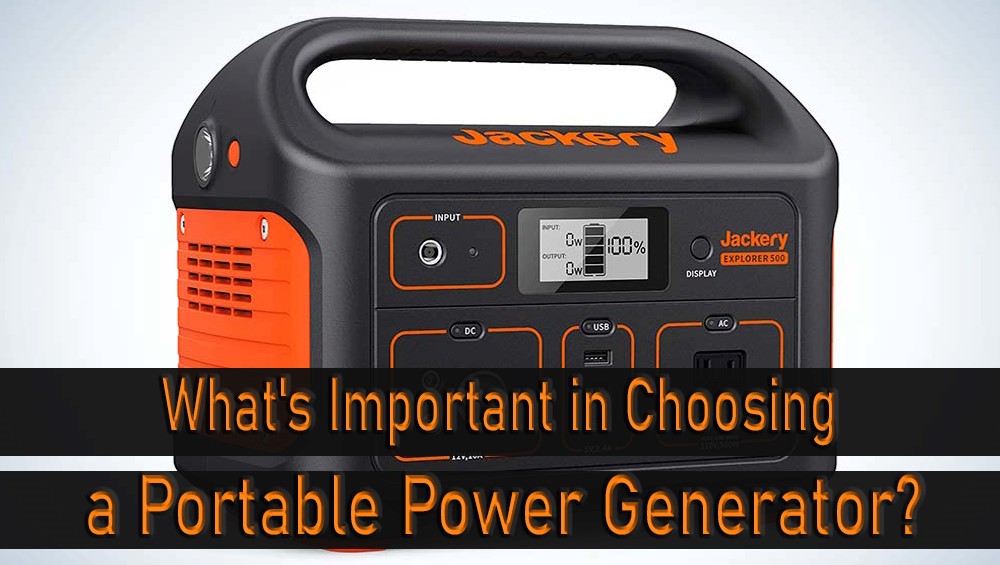Choosing a portable power generator is an important decision. It will dictate what you can do with your generator and how it can be used. It’s important to choose a portable power generator that is reliable and will suit your needs.

When choosing the right unit for you: -Power supply type (AC or DC) -Fuel type (gasoline, propane, natural gas) -Type of fuel tank/tank size -Costs of fuels and maintenance costs -Size and weight- how much do you want it to weigh? What size should it be?
One of the most important factors to consider when choosing a portable power generator is how portable and efficient it is. If you need to move your generator around often, or if you need to use it in a small space, you’ll want to choose a unit that is lightweight and easy to transport.
A generator with a small tank is also more efficient than a large one, so choose the smallest possible gasoline or propane tank for your needs.
Read Also:
Another important factor to consider is your generator’s type of power supply. If you need to run power tools or appliances that require AC power, you’ll need a generator with an AC power supply. Some generators also have a DC power supply, perfect for running electronic devices like smartphones and laptops.
Different fuel types will have different costs associated with them. Gasoline and propane are generally more expensive than natural gas, but they can be used in colder climates. Natural gas is generally safer and cheaper, but it can’t be used in as many locations as gasoline or propane. It’s important to decide which fuel type is best for your needs.
The size of the fuel tank is very important, as it will dictate how long your generator can go without refueling. On average, generators that run on natural gas or propane have larger tanks than those that run on gasoline, so they will last longer without refueling.
A large tank also means that you won’t have to refuel as often, which can be a hassle. Choose the size of the tank that is best for your needs.
Like any other piece of machinery, a portable power generator will require occasional maintenance. Make sure to factor in the costs of maintenance when choosing a generator. Some generators have more low-maintenance features than others, so you should pick one that is easy to maintain.
The size and weight of the generator are important for various reasons. If you need to move your generator often or be difficult to store when not in use, look for a lightweight design.
The size of the generator is also important- you don’t want one that is too large or too small for your needs. Make sure to choose a unit that is the right size for your space and needs.
There are two types of generators- portable power generators and inverter generators. Portable power generators are the most common type, and they run on gasoline, propane, or natural gas. Inverter generators are more expensive, but they are much quieter and more efficient than portable power generators.
Inverter generators also only run on gasoline. If you need a generator to run appliances or power tools that require AC electricity, you’ll need a generator with an AC power supply. Inverter generators are the best choice for this purpose because they run quietly and efficiently.
In general, inverter generators are more expensive than portable power generators, but if you plan to use yours frequently, it may be worth the investment. Portable power generators also tend to produce more noise, which can be a problem if you need to run them for long periods.
When purchasing a portable power generator, you have two options- buying or renting. Buying a generator is usually more expensive than renting, but it will be yours to keep, and you can use it for as long as you like.
Renting a generator is cheaper upfront, but you will need to return it once you’re finished using it. It’s important to consider both options before investing in a generator.
When choosing the right generator for your needs, keep all of these factors in mind. Portable power generators and inverter generators both have their benefits and drawbacks, so you should choose the one that best fits your lifestyle.
Make sure to consider all of these factors when making a purchasing decision. A portable power generator is a great investment if you often need to power appliances or tools when you aren’t near an electrical outlet.
When a power outage occurs, it’s important to have a backup plan. Many people choose to keep a portable generator on hand during emergencies or when they know that the power will be out for an extended period. Although purchasing a generator is expensive, it can be well worth the investment if you need reliable emergency power.
A backup generator is a great investment if your home or office often experiences power outages and you need reliable emergency power.
Portable power generators and inverter generators both have unique benefits and drawbacks, but they will both provide you with peace of mind in an emergency. It’s important to consider these factors before making a purchase decision.
When choosing the right generator, there are various factors to consider. Some generators are more high-maintenance than others, so make sure that you choose an easy-maintenance unit for you to maintain. You should also keep in mind your budget and size requirements before making a purchase decision.
If you need a portable power generator for very frequent use or a backup generator in emergencies, a portable unit might be an ideal choice. However, renting may be the more affordable option if you only need a power supply now and then.